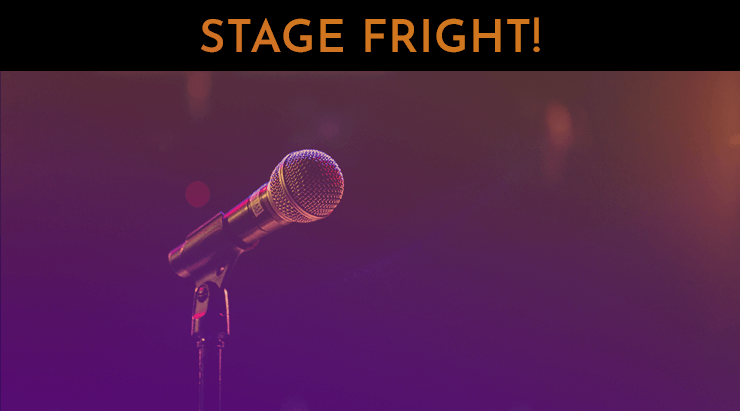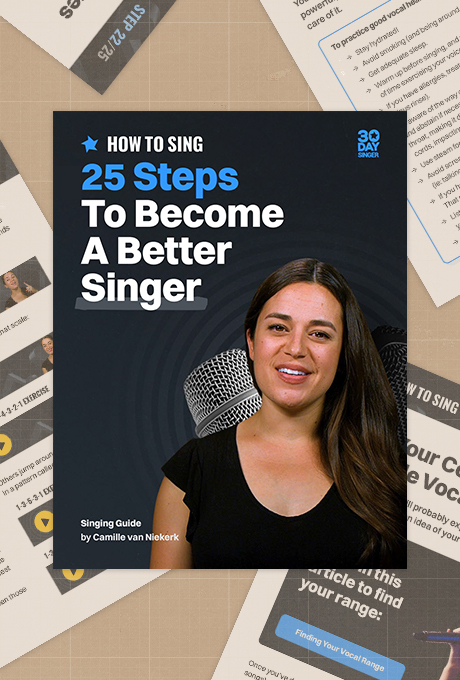Stage Fright - 6 Steps to Address Our Fears
August 5, 2019By Camille van Niekerk

When you’re waiting in the wings, about to go on stage, or when the announcer is about to call your name, you feel nervous.
What are you feeling in that moment? If you’re like me, you’d be feeling a bit of stage fright. Stage fright is something we have all been acquainted with whether because you've given a speech, or presentation.
If you’re fearless and feel completely comfortable performing or speaking in front of people, then congratulations, and you’re definitely in the minority! Public speaking is often ranked in the top 3 fears for people. And counter to what you might think, talent and experience don’t automatically rid you of stage fright. Prolific, immensely talented singers like Adele and Andrea Bocelli have been open about their experience with stage fright and continued to cope with it throughout their careers.
So, the question is, how do you deal with stage fright?
The bottom line is to find what works for you! There’s no single “trick” that will instantly ease your stage fright. But, as with anything, there are tools, practices, and changes to your mindset that can be helpful!
As a professional singer and performer, I’ve taken the advice of seasoned pros, directors, teachers, friends, bloggers, etc. I’ll share the tips that have resonated with me and been effective. I hope they help you! Please feel free to take what helps, leave what doesn’t, and take comfort in the fact that most fellow singers do get stage fright at one point or another, even if they’ve learned to combat it or are very good at hiding it. Stage fright is a natural response of your body! And yes, there are some of us who struggle more than others. My hope for you is that stage fright would not hold you back from doing something you love! If you love to sing and desire to share your voice with others, then it is a worthy cause to address your stage fright!
TIP #1: PREPARE!!!
The best antidote to stage fright, I’ve found, is preparation. Rehearse until you can sing that song in your sleep. If nerves do happen to demand more of your attention on performance day, you want to know that you can rely on muscle memory. Another consideration for performance is familiarizing yourself with the venue, sound system, emcee, etc. Prepare for a successful performance by knowing about the space and any equipment you’ll be using.
TIP #2: Remember your BREATH
When we get nervous, our breathing becomes quick and shallow. And based on what we know about singing, do we ever want quick, shallow breaths? No! Never!! Be mindful of this tendency before and during your performance. Return to the low, relaxed, diaphragmatic breathing you’ve practiced. This kind of breathing is not only necessary for healthy singing and support; it also calms your body.
 Learn all about how to handle your nerves in the lesson above!
Learn all about how to handle your nerves in the lesson above!
TIP #3: Trust your TECHNIQUE
This is why we practice! We’re training muscles and coordinations for performance. Even the physical act of getting into your singing posture can help to relax you. When nervous energy is thrown into the mix, technique is even more important.
Tip #4: Develop a ROUTINE
We’re creatures of habit! We tend to find comfort in routines. So consider developing a pre-performance routine that prepares your body, voice and mind. It could include exercise, a vocal warm-up, meditation, eating a healthy meal, deep breathing, or all of the above! Again, find what works for you.
Tip #5: Focus on the GOAL
Instead of dwelling on your fears and thoughts of what could go wrong, discipline yourself to instead think about what you look forward to with your performance or what you intend to work on. Simplify your focus to one or two small, achievable goals. A flawless performance doesn’t exist, so cross that off your list! Instead, your goals could be: connecting with the audience; telling the story in a true, honest way; remembering to ground low for high notes; or staying connected to your breath awareness even before you start to sing. You decide the goal, and focus on that!
Tip #6: Get into CHARACTER
When I’m about to perform and am still feeling a lot of nervous energy, I focus completely on the lyrics and the story. Get into character. Connect emotionally. Place yourself in the song, and make your primary goal telling a true story. The best, most impactful performances are emotionally grounded and authentic. At the end of the day, our goal isn’t to execute a technically flawless performance: it’s to share ourselves and the beauty of music with our audience.
Here’s a note to any singers who find their performance anxiety out of control: If stage fright or performance anxiety is something that you find completely overwhelming and even crippling, I highly recommend bringing it up with your doctor! They might refer you to a counselor or therapist who can help you alter unhealthy thought patterns. In some cases, they might suggest that you try a beta-blocker for performance anxiety, which is a prescription medication used by some professional performers and speakers to block adrenaline from working on the heart.
I wish you the best, singers! I’m with you on this journey of gaining confidence and overcoming stage fright, and I can assure you that although your nerves might not go away, they’ll become much easier to manage with time and experience! The next time you step onto that stage, know that I’m rooting for you.


